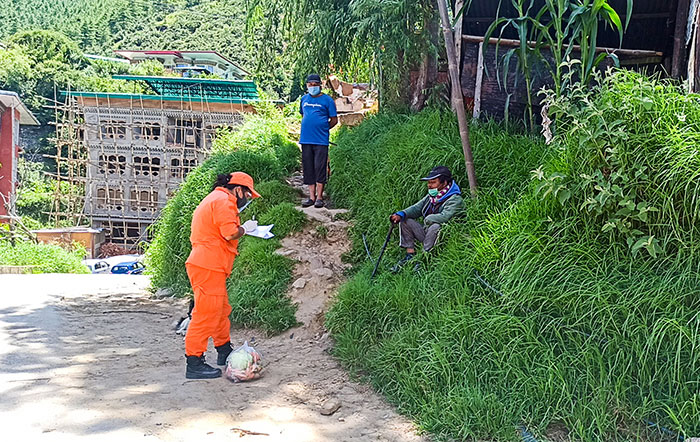Yangchen C Rinzin
A total of 16,000 packets of vegetables weighing 80 metric tonnes (MT) were distributed to 38 zones in Thimphu thromde yesterday, according to Agriculture Minister Yeshey Penjore. Each packet contained 5kg of vegetables.
Farmers in Paro and Wangdiphodrang supplied all the vegetables.
Residents were allowed to use the movement pass to come out of their homes to buy only vegetables in their respective zones. Many residents complained of running out of vegetable stocks. De-Suups and foresters brought the vegetables to the designated areas and distributed.
There were two packets: the one worth Nu 450 had potatoes, chilli, cabbage, carrot, and cauliflower and the other package costing Nu 350 had the same vegetables except for cauliflower.
Lekim in Changzamtog has been surviving on the little pumpkin that she grew in her small kitchen garden. Her neighbour shared a few green vegetables.
“I had been trying to get vegetables for the past five days, including grocery. The phones were either busy or couldn’t connect, and I was worried about how to feed my five children.”
She kept looking out of her window for the delivery truck since 8am yesterday.
“The moment I saw the car, I rushed because I was worried vegetables might exhaust.”
Many residents were relieved after they could buy vegetables for the first time since the lockdown. Residents who lived on the fringes of the city said they are still waiting for grocery they have ordered a few days ago. Some missed the vehicle that came to sell vegetables early yesterday.
However, some residents wandered from place to place as they could not spot the delivery vehicle.
Some residents requested De-Suups to allow them to harvest vegetables from their garden since they had not moved out of their homes after the lockdown. Those who had gardens adjacent to their homes were allowed to collect the produce.
“I have enough vegetables in my garden, so I didn’t buy it. I wanted the neediest to benefit first,” a resident in Changedaphu said.
The movement card or pass was punched every time people bought the vegetables to ensure they do not take more. A household got one vegetable packet per card.
Some residents could not avail vegetables since they did not have money.
A sweeper in one of the offices, Mon Maya survived eating rice with dal and borrowed vegetable oil from her neighbour.
“I requested the office for money and to deduct it from this month salary. I ordered for grocery but didn’t receive,” the 32-year-old said.
However, in a few places, De-Suups, as per the instructions, gave vegetables to those who could not afford to buy vegetables.
Meanwhile, agriculture minister Yeshey Penjore said that although the plan was to pack about 25,000 packets of vegetables, they could not due to labour shortage. With the help of about 150 De-Suups, 17,000 packets of vegetables were packed.
Lyonpo said that the government had paid only 20 percent of the profit on the cost of production for the vegetables. “We couldn’t offer price like in normal times. But if farmers get a better price and choose to sell to others, they can.”
Wangdiphodrang and other gewogs of Chukha are supplying vegetables to Phuentsholing, which has been declared a red zone. The vegetables are dropped at Rinchending check post, and the Food Corporation of Bhutan Ltd collects from there.
Vegetables from Tsirang, Dagana and parts of Sarpang are supplied to Gelephu. “There is no issue in vegetable supply in the rest of the places. We’ve not supplied in East, as they have enough vegetables,” Lyonpo said.
Lack of coordination and miscommunication among the local government and dzongkhags, according to the minister led to the failure to supply vegetables earlier.
“Farmers should inform the agriculture extension officers and dzongkhag agriculture officers about their products. Whatever surplus there is, it can be supplied to urban areas where there is demand.”


